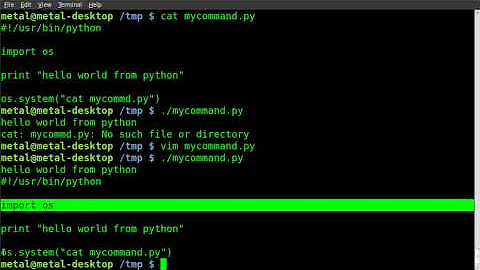Why won't this bash command run when called by python?
Solution 1
You're not actually running a bash command. What you're doing is running an executable directly and passing it arguments.
Try the following script to see what is happening:
import subprocess
p = subprocess.Popen(["echo", "a", "b", "|", "rev"], stdout=subprocess.PIPE)
print p.communicate()
The output will be:
('a b | rev\n', None)
There's no redirection happening, the "|" is being passed in literally. I.e., it is as if you had typed find ... \| parallel .... Thus the error.
There's two ways to fix it.
The easy way: pass
shell=Truetosubprocess.Popen. That will run it through the shell, with all that entails. If you do that, you also need to pass in a string instead of an array:import subprocess p = subprocess.Popen("echo a b | rev", stdout=subprocess.PIPE, shell=True) print p.communicate() # Result: ('b a\n', None)If you do this, be very careful about argument substitution into your string.
The robust way: open two processes using Python and pipe them together.
import subprocess # First command p1 = subprocess.Popen(["echo", "a", "b"], stdout=subprocess.PIPE) # Second command's input linked to the first one's output p2 = subprocess.Popen(["rev"], stdin=p1.stdout, stdout=subprocess.PIPE) # Read from p2 to get the output print p2.communicate() # Result: ('b a\n', None)This is more robust and doesn't spawn an extra shell, but on the other hand it is more typing. If you do this, note that no shell substitution happens. In your case it doesn't look like you need it, but if you'd want to use, say,
~, you'd have to get it through Python (e.g.os.getenv("HOME")).
Solution 2
You cannot split() your command string as it contains characters that need to be processed by the shell, eg ~ and |. Use the version:
process = subprocess.Popen(my_command, stdout=subprocess.PIPE, shell=True)
Related videos on Youtube
Brian Fitzpatrick
I am a Lecturer in the mathematics department at Duke University.
Updated on September 18, 2022Comments
-
Brian Fitzpatrick over 1 year
The command
$ find ~/foo/ -type f -iname "*.txt" -print0 | parallel -0 catuses GNU Parallel to print all the
.txtfiles under~/foo/.I have a python script where I want to call this bash command:
import subprocess, sys def runBashCommand(my_command): process = subprocess.Popen(my_command.split(), stdout=subprocess.PIPE) output = process.communicate()[0] return None def makeCommand(my_path): return "find {} -type f -iname \"*.txt\" -print0 | parallel -0 cat".format(my_path)Issuing
>>> makeCommand('~/foo/')returns
'find ~/foo/ -type f -iname "*.txt" -print0 | parallel -0 cat'but issuing
>>> runBashCommand(makeCommand('~/foo/'))yields the error
find: paths must precede expression: | Usage: find [-H] [-L] [-P] [-Olevel] [-D help|tree|search|stat|rates|opt|exec] [path...] [expression]what's the problem with my script?
-
 Ciro Santilli Путлер Капут 六四事 over 5 years
Ciro Santilli Путлер Капут 六四事 over 5 years
-
-
 Wildcard almost 8 yearsCan you expand on "be very careful about argument substitution into your string"? It seems that this applies to your second method but no example is given as for how it applies to the first.
Wildcard almost 8 yearsCan you expand on "be very careful about argument substitution into your string"? It seems that this applies to your second method but no example is given as for how it applies to the first. -
madameFerry almost 8 years@Wildcard: with
shell=True, it passes the whole string into the shell. Let's say you wanted to get the output oflsfor a given directory.subprocess.Popen(["ls", dir], ...)would always work. However,subprocess.Popen("ls " + dir, ..., shell=True)would fail ifdirhad spaces in it... let alone what would happen ifdirgot set to something like";rm -rf /*". So that would be something to really pay attention to, especially ifdircomes from user input. But if you don't useshell=True, this kind of thing can't happen.





